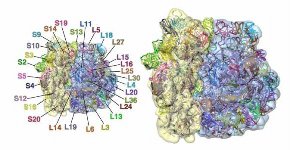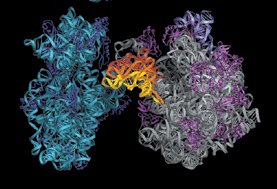
The Ribosome is perhaps the most complex machine at the centre of life. It is the place where proteins are assembled by putting together the 20 different amino acids in a specific order coded by information "photocopied" from the cell's "hard drives" - the DNA molecules.

Bruce Alberts is the President of the National Academy of Science in the US and organisation which thrown its weight behind the campaign to exclude consideration of Intelligent Design from Science.
In his huge textbook on Molecular and cellular biology he says this about the ribosome:
“The complexity of a process with so many interacting components has made many biologists despair of ever understanding the pathway by which protein synthesis evolved.”
 He goes on to argue that RNA in the ribosome (the factory for assembling amino acids into long chains in the correct order using the code message copied from the DNA) provides a clue to its simple evolutionary precursors.
He goes on to argue that RNA in the ribosome (the factory for assembling amino acids into long chains in the correct order using the code message copied from the DNA) provides a clue to its simple evolutionary precursors.The important point is that Bruce Alberts here acknowledges a real and serious problem. He goes on to suggest some hope for Darwinists but it is a clutching at straws sort of hope.
Biologists have really serious problems with explaining complexity using chance and selection but they are determined to teach our children that no other more appropriate causes of complexity can be seriously considered.
9 comments:
Hello Jeff,
I am not saying "I know for certain you will never find a solution to the origin of life" (personally I think a chance solution will never be found) BUT I am saying that scientists have absolutely no right to say that "we know for certain that a natural chance solution will be found eventually if we keep looking hard enough" BOTH statements shut down possible answers which have not been ruled out.
Certainty that a natural solution will be found is just as wrong as certainty that a natural solution will not be found.
I am convinced that there never will be a natural solution based solely on chance. I am convinced that the origin of life reserachers are barking up the wrong tree and will eventually get tired of it.
(Just as I am convinced that Richard Faragher will not solve the problem of ageing and death before he and I and you die)
Saying an intelligent designer did it is not a research stopper. This is one of the strong points that Steve Fuller is making from the history of science. The idea of an intelligent designer was perhaps the greatest stimulus to the origin of science.
My point was that Bruce Alberts acknowledges the real problem but insists on shutting out the possibility that philosophical naturalism may actually be wrong.
BTW I hope you have a great Christmas!
Thanks for your interest and comments.
Just wanted to say that I follow this blog closely and really enjoy the posts and the discussion. You seem to have a higher level of civility than exists on many of the sites discussing this issue.
Hello Kingfisher,
You live in a beautiful part of the world... some wonderful pictures on your blog!
Thank you for your interest...have a happy Christmas.
"Nobody denies that the origin of life is an extremely difficult problem. That it has not been solved, though, does not mean it is impossible."
If it has not been solved, then the idea that we all came to be from matter with no intervention by any intelligent agent should not be held with the kind of confidence that is now customary.
"But do you know what? There's still an unsolved problem. We still don't understand the chemistry that forges the link between those two beads on a chain."
This is not AT ALL analogous to the ID case.
We know there must be chemical bonds between those two molecules, even if we don't understand them at present, because we have tons and TONS of EXPERIMENTAL evidence that such chemical bonds govern interaction between molecules.
We do not have anything like that kind of evidence for the view that unintelligent forces can produce irreducible complexity, because the only times when we are able to trace the causes of an irreducibly complex structure, we find that someone did it.
It is therefore entirely reasonable to doubt that unintelligent forces could account for the origin of irreducible complexity.
jeffahn
"1. Biochemistry is not chance. It inevitably produces complex products. Amino acids and other complex molecules are even known to form in space."
Dude! DNA is a digital code. Biochemistry doesn't produce digital codes. Digital coders to that. As far as I know all the digital coders, myself included, are categorically classified as intelligent agents.
Nice try though! Or rather, nice try by the computer science illiterate that wrote the talkorigins entry you quoted...
Jeff,
You said:
"So, Dave, who then is the original "digital coder" according to you? He doesn't exist according to your much beloved Dembski, did you know that? Demski said that the only source of CSI is "intelligent agents", and all "intelligent agents", by definition, have CSI, so how could CSI then arise from nowhere?"
It seems to me that we either assume
(a) eternal (unless you believe that nothing can produce something)unintelligent, self existent matter created everything
OR
(b) eternal intelligence created matter and all that followed.
Who is to say which is a more logical assumption? Intelligence first or matter first. That really is the crunch between atheism and theism.
Andrew Rowell,
Certainty that a natural solution will be found is just as wrong as certainty that a natural solution will not be found.
I don't think anyone is absolutely certain that a "natural" solution must be found. It's just that there are two options. Keep working to try to find a naturalistic answer or give up.
Or, if you think you can detect the supernatural through forensic science and you can get funding for it, good for you, you've got a paycheck. Now, if you can do that and manage to publish actual results that are reproducible then it might be on the road to being taught to kids in public schools.
Sorry for the double post, but:
It seems to me that we either assume
(a) eternal (unless you believe that nothing can produce something)unintelligent, self existent matter created everything
OR
(b) eternal intelligence created matter and all that followed.
OK, you or I or anyone else can assume anything we like. We can philosophize about things like this, but science has little if any way in which to adress such questions. Is all of existence eternal? Is there a first cause? Science as we know it has no way of even broaching the subject.
The limit, for now, is being able to hypothesize about things beyond this universe (universe not being the cosmos) based on existing science. It still has to fit existing data and be mathematically sound. Regardless, it remains an untested and perhaps untestable hypothesis.
Post a Comment